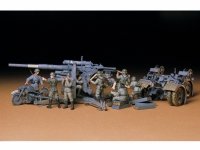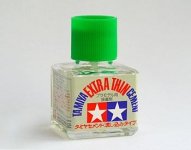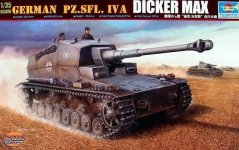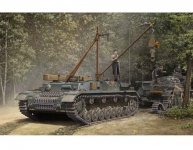-
Załączniki bezpieczeństwa
Załczniki do produktuZałączniki dotyczące bezpieczeństwa produktu zawierają informacje o opakowaniu produktu i mogą dostarczać kluczowych informacji dotyczących bezpieczeństwa konkretnego produktu
-
Informacje o producencie
Informacje o producencieInformacje dotyczące produktu obejmują adres i powiązane dane producenta produktu.MiniArt
-
Osoba odpowiedzialna w UE
Osoba odpowiedzialna w UEPodmiot gospodarczy z siedzibą w UE zapewniający zgodność produktu z wymaganymi przepisami.
MiniArt 35298 Pz.Kpfw.IV Ausf. H Vomag 1/35
Plastikowy model czołgu do sklejania. Nie zawiera kleju ani farb.
Panzerkampfwagen IV (PzKpfw IV) – niemiecki czołg średni z okresu II wojny światowej. Aż do jesieni 1942 roku był najcięższym wozem pancernym służącym w armii III Rzeszy. Początkowo był uzbrojony w krótkolufowe działo kalibru 75 mm, jednak pod wpływem doświadczeń wyniesionych ze starć z radzieckimi czołgami T-34 i KW-1 przezbrojono go w armaty długolufowe. Przez kilka miesięcy był najlepszym czołgiem państw Osi i jedynym, który mógł nawiązać równorzędną walkę z wozami alianckimi. Mimo pojawienia się cięższych maszyn PzKpfw V Panther i PzKpfw VI Tiger nigdy nie został przez nie wyparty z dywizji pancernych i do końca wojny był podstawowym czołgiem niemieckim.
The Panzerkampfwagen IV (PzKpfw IV), commonly known as the Panzer IV, was a German medium tank developed in the late 1930s and used extensively during the Second World War. Its ordnance inventory designation was Sd.Kfz. 161.
The Panzer IV was the most numerous German tank and the second-most numerous German armored fighting vehicle of the Second World War, with some 8,500 built. The Panzer IV chassis was used as the base for many other fighting vehicles, including the Sturmgeschütz IV assault gun, the Jagdpanzer IV tank destroyer, the Wirbelwind self-propelled anti-aircraft gun, and the Brummbär self-propelled gun.
The Panzer IV saw service in all combat theaters involving Germany and was the only German tank to remain in continuous production throughout the war. The Panzer IV was originally designed for infantry support while the similar Panzer III would fight armoured fighting vehicles. However as the Germans faced the formidable T-34, the Panzer IV had more development potential with a larger turret ring to mount more powerful guns and took over the anti-tank role. The Panzer IV received various upgrades and design modifications, intended to counter new threats, extending its service life. Generally, these involved increasing the Panzer IV's armor protection or upgrading its weapons, although during the last months of the war, with Germany's pressing need for rapid replacement of losses, design changes also included simplifications to speed up the manufacturing process.
The Panzer IV was partially succeeded by the Panther medium tank, which was introduced to counter the Soviet T-34, although the Panzer IV continued as a significant component of German armoured formations to the end of the war. The Panzer IV was the most widely exported tank in German service, with around 300 sold to Finland, Romania, Spain and Bulgaria. After the war, Syria procured Panzer IVs from France and Czechoslovakia, which saw combat in the 1967 Six-Day War. 8,553 Panzer IVs of all versions were built during World War II, a production run in Axis forces only exceeded by the StuG III assault gun with 10,086 vehicles.
HIGHLY DETAILED MODEL
DRIVER COMPARTMENT INTERIOR ACCURATELY REPRESENTED
FULLY DETAILED FIGHTING COMPARTMENT INTERIOR
HIGHLY DETAILED INTERIOR OF TURRET
ALL HATCHES CAN BE POSED OPEN & CLOSED
FULL AMMUNITION INCLUDED
ENGINE INCLUDED
WORKABLE TRACKS INCLUDED
CLEAR PLASTIC PARTS INCLUDED
PHOTO-ETCHED PARTS INCLUDED
DECAL SHEET FOR 3 OPTIONS











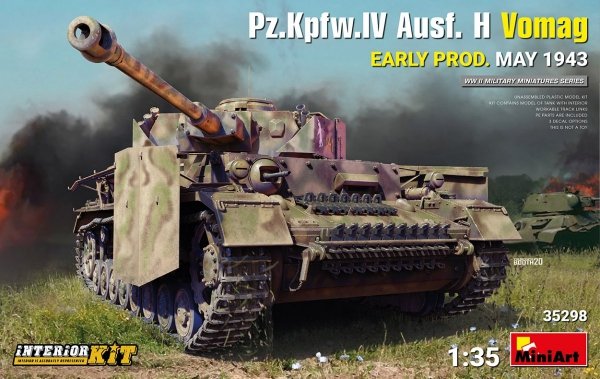


 3 szt.
3 szt.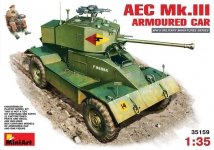
 6 szt.
6 szt.
 1 szt.
1 szt.
